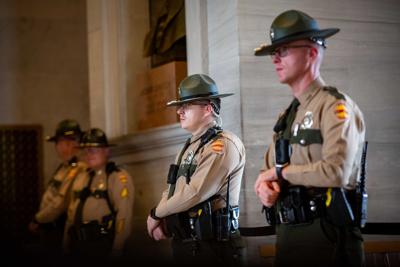The final week of the Tennessee General Assembly saw several major bills finally make their way through both chambers.
Behn called out of order as House Democrats see amendments to ‘trafficking’ legislation shot down
Notably, during a press conference after the end of session, which came to a close on Thursday evening, Republicans touted a slate of criminal justice reforms — though Democrats stated in a press conference they didn't see the reforms the same way. Even so, a few bipartisan bills made their way through the end of the session too.
Shifting judges
A bill (HB2002) passed removing both a criminal and civil judge from Shelby County’s 30th Judicial District and creating an additional trial court in the 4th and 19th Judicial Districts. Those districts include Grainger, Jefferson, Sevier and Cocke counties, and Robertson and Montgomery counties, respectively.
Shelby County representation in both chambers pointed out the Tennessee Comptroller’s Office data that is used to support the need for the move is outdated. The last data available is from 2019. Sen. Brent Taylor (R-Memphis) said he asked for a post-COVID study from the comptroller and was told it could be completed by January 2025.
Rep. Andrew Farmer (R-Sevierville), who sponsored the legislation, said the data shows that since 2002 the 30th district has been “over-judged.” As such, he said, the legislation is based on a trend of weighted data, not just one year’s data alone. Farmer added that the time is suitable to remove those judgeships because one judge has resigned and another has been recommended to the Tennessee Supreme Court.
“We’re not taking anyone’s career away from them,” Farmer said. “We’re moving both of these judgeships at a time they’re going to be vacant.”
The Tennessee General Assembly passed a budget — along with legislation arming teachers and criminalizing ‘abortion trafficking’
Despite passing both the House and Senate, the bill saw rare bipartisan opposition from Shelby County Republicans and Democrats. Reps. John Gillespie (R-Memphis), Tom Leatherwood (R-Arlington), Kevin Vaughn (R-Collierville) and Mark White (R-Memphis) joined House Democrats in voting against the bill 71-27. Notably, in the Senate, East Tennessee Sens. Richard Briggs (R-Knoxville) and Art Swann (R-Maryville) joined Democrats and Taylor in the 22-9 vote.
The funding for the judgeships was approved in the budget passed this session. An amendment was added in the Senate and adopted by the House to address any backlog within the 30th Judicial District.
Right to bail
A resolution passed amending the Tennessee Constitution to remove the right to bail for certain offenders.
It would apply to those who commit a capital offense, an act of terrorism, second-degree murder, aggravated rape of a child, aggravated rape or grave torture. The right to bail could also be removed for any other offender who, if convicted, could not be released before at least 85 percent of the total sentence.
The vote for the legislation fell nearly along party lines with only Sen. Todd Gardenhire (R-Chattanooga) joining the Democrats who opposed.
Liability in cyberattacks
Legislation that would shield private companies from civil liability in class action suits due to cybersecurity events passed both chambers.
The bill states that private entities are not liable in the event of a cybersecurity attack unless the events could potentially be the result of the entities' willful, wanton or gross negligence. In the 76-18 vote in the House, Rep. Gino Bulso (R-Franklin) voted against the bill. The vote was 25-5 in the Senate.
"Back the Blue"
Rep. Kip Capley (R-Summertown) sponsored HB1881, which he named the “Back the Blue Act.”
The bill increases the penalty for assault against a law enforcement officer. It changes the offense from a class-A misdemeanor to a class-E felony. That would increase the mandatory minimum sentence from 30 days to 60 days. It also doubles the fine from $5,000 to $10,000.
Rep. Justin Pearson (D-Memphis) asked how the legislation would affect those who are potentially having a mental health crisis. House Majority Leader William Lamberth (R-Portland), a co-sponsor, said the law requires an intent. Therefore someone having a crisis and subsequently harming an officer in the process likely would not meet the criteria for the felony charge.
The bill passed despite opposition from teachers, students, advocates and Democrats. Here’s what it means.
“You can’t say that you back the blue as this legislation articulates, but then you do nothing to ensure the conditions that officers, including my family members, are encountering every day in our communities are as safe as possible,” Pearson said, noting his discontent with the legislature for not passing more gun safety laws this session.
Parental accountability
A bill passed by the House and Senate last week would allow a judge to place an order of restitution up to $1,000 to be paid by the parent or guardian of a child found to be delinquent more than once.
Rep. John Gillespie (R-Memphis) fielded questions from Democrats over the bill’s seeming intent to criminalize parents for their children’s actions. Many shared concerns regarding how the law could impact a parent who may have minimal access to resources. They also asked if the legislation could be applied to foster parents. Gillespie said he did not believe it could be applied to foster parents and noted he has worked in nonprofit services for youth and believes those resources could be accessed more than they are.
Rep. John Ray Clemmons (D-Nashville) said he has also worked in the nonprofit youth services sector and sees the issue very differently.
“We can do better," Clemmons told Gillespie. "You can do better. You’ve worked with these children. You should know the circumstances they’re facing. We are not going to solve this problem by criminalizing parents [who] are doing the best that they can.”
Gillespie told Clemmons and others in the House the bill is up to a judge’s discretion, and it would be their call to decide whether the potential fine is necessary. The bill passed 74-24 in the House and 24-5 in the Senate.
Industrial development
Rep. G.A. Hardaway (D-Memphis) and Senate Minority Leader Raumesh Akbari (D-Memphis) passed legislation that would allow the establishment of industrial development corporations to assist and benefit small and locally owned businesses.
Akbari pointed out that IDCs are not a new concept, but the bill gives local governments the ability to be able to create them for the benefit of their own local businesses. Costs related to the creation of an IDC will be funded by local governments. The Tennessee Department of Economic and Community Development is required to provide guidance to local governments in the creation of an industrial development corporation.
“We’ll build this from the ground up with input from small and local businesses,” Hardaway said. “For me, economics and education determine how free you will be in America today. This is just one piece of what I believe is going to empower our communities to be able to fight back against the poverty, the illiteracy, the crime that’s ravaging our communities currently.”
Neighborhood advisory committees created by the corporations are required to assist in promoting, funding and cultivating the businesses. Also, the General Assembly’s joint government operations committee is required to submit a report to the legislature by Jan. 31, 2028, regarding the effectiveness of any industrial development corporations created over those four years.
The House passed the bill 95-1 and the Senate passed it 27-3.
Artificial intelligence
The legislature nearly unanimously passed a bill to create an artificial intelligence advisory council.
Tennessee becomes first state to codify voice, image and likeness protections against AI
The bill would require the council to recommend an action plan for the use of AI in state government that “aligns with the state’s policies and goals and that supports public employees” in their delivery of services. The council is required to make specific recommendations for policy changes and investments. It should be sure to include clear usage policies for the state.
The council will be made up of 24 members. The bill passed 92-1-3 in the House, with Rep. Justin Jones (D-Nashville), who filed an amendment that was not considered, as the only opposition vote. Reps. Gloria Johnson (D-Knoxville), Justin Pearson (D-Memphis) and Jason Powell (D-Nashville) marked themselves as present and not voting. In the Senate, the bill passed 30-0.









